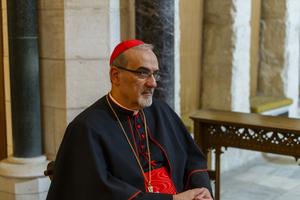Maronite Bishop Warns: World is ‘Washing its Hands’ of Lebanon
Bishop Zaidan explained that it was not a question of privileging Christians in Lebanon over other religious groups in the country “making them servants,” but that Christians need to have an equal footing with every other group in the country and the same rights and voice in the political sphere.

WASHINGTON, D.C. — Supporting Lebanon’s Christian population is key to ensuring the political survival of the country and wider regional security, a Maronite bishop said Tuesday.
Bishop Elias Zaidan of the Maronite Eparchy of Our Lady of Lebanon of Los Angeles said that the prospect of one of the few democratic nations in the Middle East becoming a failed state would have dire consequences for its Christian community and for wider regional stability.
The bishops made the comments during a discussion organized by the group In Defense of Christians, titled “President Trump’s Middle East Priorities Intersecting in Lebanon,” and hosted by IDC policy director Peter Burns.
Bishop Zaidan was joined by Robert Nicholson, the founder and executive director of the Philos Project, and Alberto Fernandez, president of Middle East Broadcasting Networks.
“It is in the best interest in the whole world to keep Lebanon as free, as democratic, as independent and sovereign as much as possible,” said Zaidan.
“And the only way you can make this happen [is by] strengthening the presence of Christians,” he added.
Bishop Zaidan explained that it was not a question of privileging Christians in Lebanon over other religious groups in the country “making them servants,” but that Christians need to have an equal footing with every other group in the country and the same rights and voice in the political sphere.
Lebanon has the largest Christian population in the Middle East, with Christians making up about a third of the population of Lebanon. Most Lebanese Christians are Maronite or Eastern Orthodox.
Bishop Zaidan said that the rising instability is causing Christians a steady exodus from the region and adding to instability in the country.
“As a Christian, [they] would start giving up right away,” he said. “They fear ‘the country is not mine, and I’m leaving.’”
A stable and more democratic Lebanon would be a boon to its neighbor Israel, he said, as the two countries are now constantly “at the edge of war.” And he suggested that a pluralistic Lebanon with a strong Christian population would serve to de-escalate tensions in the region.
“As for Israel, you don’t need another fanatic country that could threaten the presence of Israel as well,” said the bishop. Israel and Lebanon are the two most democratic countries in the Middle East, Zaidan explained, but he expressed concern at how the country’s mullahs are able to swing elections toward a certain candidate.
The bishop said that it was “obvious” that Lebanon is “becoming more and more hostage to Iranian interests,” and to Hezbollah, an Islamist militant political party - designated a terrorist actor by the United States, the European Union, and the United Kingdom.
Lebanon remains in the grip of civil unrest, with mass protests ongoing since October 2019. The economy has collapsed and its currency has crashed. Bishop Zaidan said it is essential that the international community take steps to support the country’s democratic institutions.
“If the American government let the state fall, it would be disastrous,” he said. “That’s when Hezbollah can take over, easily. And the Christians will give up right away.”
Bishop Zaidan said it was crucial to ensure that Lebanon “doesn’t collapse at every level,” from economics to society, and he does not think enough is being done.
“I feel like right now, Lebanon is in intensive care. It’s a patient, and I don’t think anybody is visiting them,” likening the situation to the coronavirus pandemic.
“The whole world, they’re washing their hands.”
- Keywords:
- bishop zaidan
- christians
- idc
- lebanon
- middle east
- philippe nassif
















